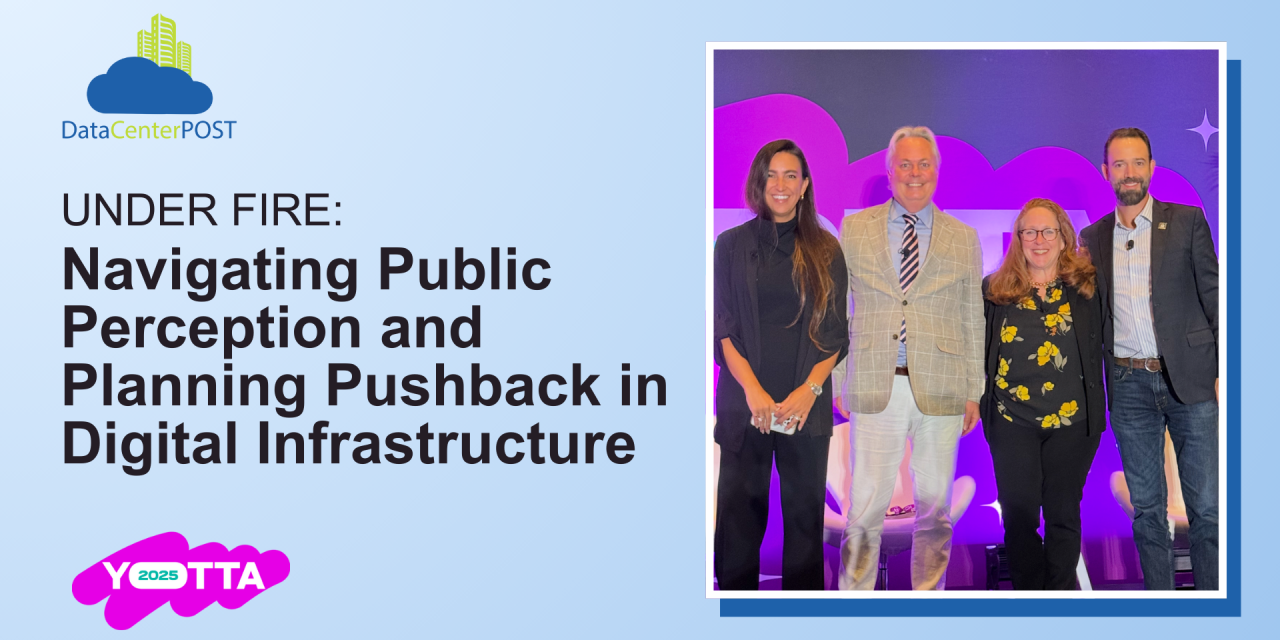At the 2025 Yotta event held at the MGM in Las Vegas, industry leaders came together to confront one of the most pressing issues in digital infrastructure today: how to balance rapid growth with community trust. The panel, “Under Fire: Navigating Public Perception and Planning Pushback in Digital Infrastructure,” was moderated by Ilissa Miller, CEO of iMiller Public Relations, and featured expert perspectives from Santiago Suinaga, CEO of Infrastructure Masons; Tyson Slocu, Director, Energy Program of Public Citizen; and Teryn Zmuda, the CRO for the National Association of Counties (NACo).
The Challenge: Expansion Meets Resistance
As data centers scale to support AI, cloud, and digital transformation, communities are increasingly voicing concerns about energy use, water consumption, land impact, and transparency. Miller framed the discussion around a central question: how can the industry stop communities from saying “no” and instead encourage them to ask, “what do we need and want?”
Key Perspectives from the Panel
Santiago Suinaga: Balancing Growth with Community Needs
Suinaga highlighted how the industry’s early “behind the curtain” approach has fueled mistrust. Today, communities see the scale of growth without clear benefits. He stressed the need for transparent messaging and frameworks like the iMasons Social Accord, which addresses economic, environmental, and social impacts holistically. Every community is unique, and engagement strategies must adapt to local priorities
Teryn Zmuda: The View from Local Governments
Representing county officials across the U.S., Zmuda emphasized that local leaders often hold the most trust in their communities. Yet developers frequently miss the mark by:
- Misaligning incentives (e.g., promising jobs where the real priority is healthcare or addiction services).
- Starting conversations too late.
- Overlooking the complexity of governance structures.
Her message was clear: early, tailored engagement is essential
Tyson Slocum: Transparency and Trust at the Core
Slocum brought the community advocate perspective, pointing to widespread frustration with non-disclosure agreements that limit open dialogue. He urged developers to:
- Build genuine local relationships, not just with officials but with community leaders.
- Address emotional connections to land and home, not just financial incentives.
- Demonstrate real benefits, such as local hiring, education, and health services.
He also cautioned that abuses of loopholes or tax incentives by “bad actors” poison the well for responsible developers.
The Role of Federal Policy
Panelists raised concerns that the U.S. Federal AI Plan could both accelerate infrastructure growth and risk sidelining local voices through emergency powers. While federal support is critical, panelists agreed that local frameworks and planning remain the most sustainable path forward.
Toward a Digital Infrastructure Framework
Miller closed the discussion by introducing the OIX Digital Infrastructure Framework, an initiative of the OIX Association, where Miller is a Board member and the Chair of this committee. Designed to help communities assess what they have, what they need, and what they want, it aims to shift the dialogue from secrecy and resistance to empowerment and collaboration.
Key Takeaways
The conversation distilled into four powerful lessons:
- Transparency is non-negotiable. Communities need openness, not NDAs.
- Engagement must be early and local. Tailor conversations to each jurisdiction’s priorities.
- The industry needs a unified voice. A synchronized story about why digital infrastructure matters is overdue.
- Frameworks build bridges. Tools like the Digital Infrastructure Framework can guide communities toward informed decisions and shared goals.
As Miller summed up, success will come when industry and community leaders choose to work with, rather than against, one another.


